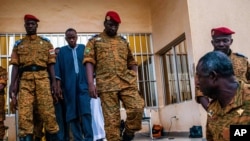The appointment of Lt. Col. Isaac Zida as Burkina Faso’s prime minister in a transitional administration will help ensure security and stability ahead of the country’s next presidential and legislative elections, according to Ablasse Ouedraogo, a leading opposition member.
He said the appointment doesn’t contravene the accord signed between groups including civil society, opposition groups and the military in a bid to form a transitional government ahead of elections.
“According to the charter, there is no restriction for the military [person] to be appointed a prime minister,” said Ouedraogo. “We don’t see any difficulty in it, since appointing Mr. Zida means stability. Don’t forget that he is a military and right now in the Sahel region you know that there are problems with security, and to have a military [person] in this position will be helpful for the country.”
Transitional government
Zida is now tasked to form a government to help steer the country to the elections.
Ouedraogo said opposition and civil society groups will be part of the new government after Zida was appointed by interim President Michel Kafando.
But some Burkinabes objected to Zida’s appointment, since he served as a senior army official in former President Blaise Compaore’s government.
Ouedraogo said it would be unlikely to find an independent Burkinabe who is not linked to the deposed leader after Compaore’s over two-and-a-half decades in power.
“If you want to eliminate all the people who have worked for the regime during 27 years, do you think you can find somebody completely neutral? No, this is not the case,” said Ouedraogo.
“The situation in Burkina Faso is that people [are] requesting for change and they have got the change, the departure of President Blaise Compaore. What we would like is to make the transition a success. When I say success, it is the organization of the forthcoming presidential and legislative elections at the end of the transition,” he said.
Expectations
Ouedraogo said Burkinabes want to vote in both presidential and parliamentary elections to choose their own leaders as the transitional period ends, after protesters forced Compaore to step down and go into exile.
“Al Burkinabes feel proud of what happened. The Burkinabes were able in two weeks to find a solution to the crisis in adopting the charter, and the carters is a roadmap towards the organization of elections,” said Ouedraogo. “What we need from the government is to work hard in such a way to ensure, transparent, equitable elections by the end of 2015. This is what the people of Burkina Faso [are] expecting from the new government.”





